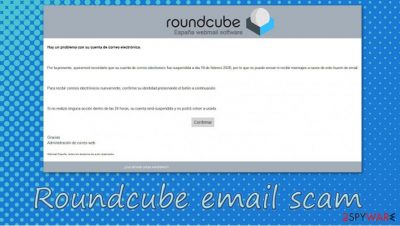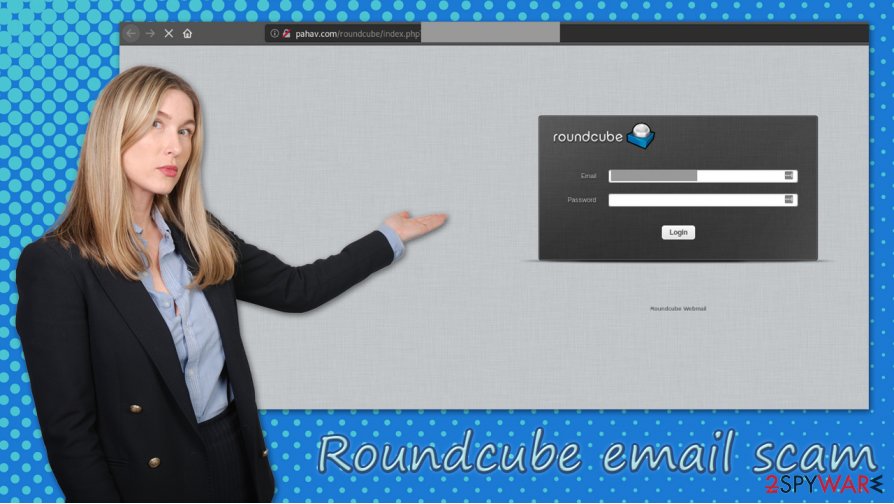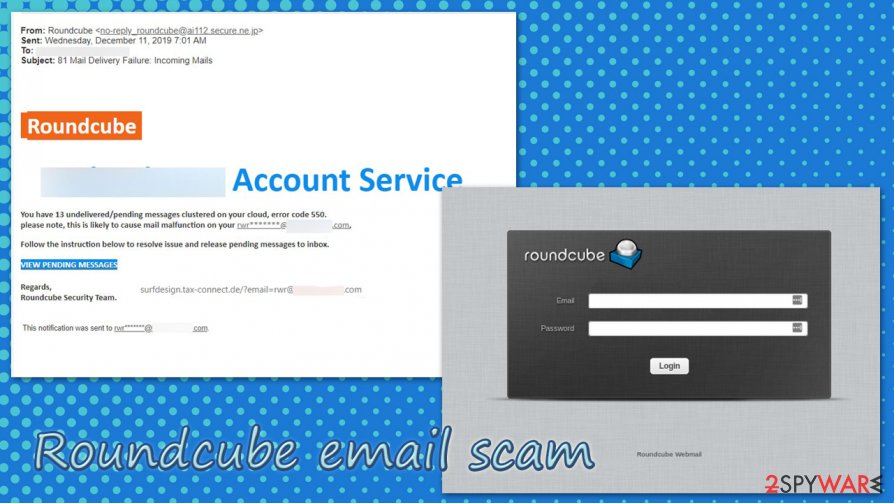Roundcube email scam (Removal Guide) - Free Instructions
Roundcube email scam Removal Guide
What is Roundcube email scam?
Roundcube email scam is a fake message that attempts to steal you login credentials

“Roundcube – Your Email Storage Is Filled Up” email scam is a phishing notification that users can get inside their email at any time. Inside, it is claimed that users ran out of the storage space in the Roundcube email account or that their account is due to be suspended for various reasons. While Roundcube is a legitimate service, it operates quite a bit different than Gmail or Hotmail, so it does not provide regular users email accounts. In other words, “Roundcube – Your Email Storage Is Filled Up” is a mere phishing attempt that is delivered to thousands of users worldwide.
Roundcube email scam attempts to make users click on a link that will lead them to a spoofing site,[1] and they will be asked to enter their email credentials. In such a way, cybercriminals manage to create a large database of email/password combinations, all of which can be used for further exploitation, including financial theft or even identity fraud.
| Name | “Roundcube – Your Email Storage Is Filled Up” |
| Type | Email scam, phishing |
| Distribution | Malicious messages show up in users' email inboxes |
| Aim | To convince users to click on the embedded link and enter their personal information – usually, email login credentials |
| Dangers | Users who fall for the scam might suffer from serious privacy and security risks in the future, e.g., have their private data sold on the underground forums, included into a botnet, get infected with malware, and much more |
| Prevention | Never click on the provided link, open attachments, or provide your personal/sensitive information |
| Removal | Report the email to your local authorities and then delete it. If you clicked on a link and interacted with a suspicious website, you should scan your machine with anti-malware software and change your email password |
| Further steps | If malware was found on your computer, we also recommend using FortectIntego to fix virus damage and remediate your computer |
Roundcube is an open-source platform that provides webmail solutions with desktop-like UI for the individual hosting providers.It includes a variety of features, hence making it attractive choice for many. However, it is important to note that regular users would not be able to create an account and use it as their primary email account.
Roundcube scam emails began circulating in October 2019. The the number of phishing emails circulating around the web was so high that the Roundcube even provided an official warning:[2]
We have been receiving many reports about phishing attempts appearing out in the wild which are targeting end users of webmail services powered by Roundcube.
The particular scam evolves around users being told that their account storage space of 99 GB is running out, and they need to upgrade as soon as possible. In case they fail to do what is asked for, several email features, such as sending or receiving new messages, will be disabled. Roundcube email scam than provides a link titled “CLICK HERE TO ADD MORE STORAGE.”
Those who click on the provided link will be redirected to a website that looks identical to their email login page. Users are then asked to enter their login and password of their accounts. This information will then be delivered to cybercriminals, who can misuse it for various malicious purposes, or simply sell it on the underground hacking forums for profits.
There have been several data breaches that resulted in millions of users' email account theft – this information is particularly useful for the attackers. Victims can then be the target of further scam campaigns, and the hijacked email account can be used to steal other user accounts, such as social media, banking, and much more.

Besides, Roundcube email scam can also result in malware infection. While stealing information directly is profitable, employing data-stealing malware can be even more efficient for the attackers, as they could harvest all the information stored on the computer. Thus, if the message includes an attachment or the link asks you to download something, remove Roundcube email scam without thinking twice.
Roundcube email virus removal should be performed with powerful anti-malware software. In case your PC got indeed infected, you should also attempt to fix virus damage with tools such as FortectIntego. Finally, you should reset your email password (and do the same for other accounts you use the same password for).
Malicious spam campaigns infect users with malware, steal personal information
Spam emails are one of the main attack vectors used by cybercriminals to infect users with malware. Phishing is very common; it intends to mislead by making them believe things that are not real. Nonetheless, since the attackers compile virtually identical emails that resemble familiar brands and use similar formatting/brand logos, many users fall for the scam and click on links or open attachments.
Most malware is delivered via malicious attachments, which are often obfuscated executables presented as PDF or other regular file types. Additionally, macro-infused MS Office documents are also regularly used to download the malicious payload from a remote server. Thus, never allow a suspicious document to run the macro feature, otherwise known as the “Allow content” prompt. You should also equip your machine with powerful anti-malware software that could stop most of the intrusions.
Another popular tactic used by cybercriminals is to redirect them to spoofing sites. Netflix, Facebook, UPS, and other popular names are typically used. The embedded links then lead users to spoof websites that are difficult to distinguish by regular users. Thus, they enter their credentials without thinking too much about it.
To avoid being deceived, always check the email address of the sender properly, hover over the link that is presented inside, and look for grammar/spelling mistakes within the text.

Steps to take after receiving Roundcube email scam
Roundcube email scam removal from the inbox is not something that you should do immediately. Accessing the message will not compromise your online security or computer safety in any way. However, troubles start if you begin to interact with the presented phishing content. In some cases, the installation of malware can be performed automatically as soon as you click on the link (if you have outdated software[3] installed on your system). Before you remove Roundcube scam email, you should forward it to the local authorities that deal with fraud – it will help the investigation and spreading awareness to others.
If you have not interacted with Roundcube email scam, you should not be worried – simply eliminate the email and forget about it after reporting. However, if you clicked on links or downloaded something, you should be concerned. First of all, you should scan your device with anti-malware software to ensure no malware has been injected. After that, you should reset passwords or all your accounts that are linked to the email information of which you provided to the attackers.
How to prevent from getting spam tools
Do not let government spy on you
The government has many issues in regards to tracking users' data and spying on citizens, so you should take this into consideration and learn more about shady information gathering practices. Avoid any unwanted government tracking or spying by going totally anonymous on the internet.
You can choose a different location when you go online and access any material you want without particular content restrictions. You can easily enjoy internet connection without any risks of being hacked by using Private Internet Access VPN.
Control the information that can be accessed by government any other unwanted party and surf online without being spied on. Even if you are not involved in illegal activities or trust your selection of services, platforms, be suspicious for your own security and take precautionary measures by using the VPN service.
Backup files for the later use, in case of the malware attack
Computer users can suffer from data losses due to cyber infections or their own faulty doings. Ransomware can encrypt and hold files hostage, while unforeseen power cuts might cause a loss of important documents. If you have proper up-to-date backups, you can easily recover after such an incident and get back to work. It is also equally important to update backups on a regular basis so that the newest information remains intact – you can set this process to be performed automatically.
When you have the previous version of every important document or project you can avoid frustration and breakdowns. It comes in handy when malware strikes out of nowhere. Use Data Recovery Pro for the data restoration process.
- ^ What is Spoofing?. Forcepoint. Cyber education.
- ^ Phishing Alert. Roundcube. Free and Open Source Webmail Software.
- ^ The security risks of outdated software. Parker Software. Official site.
